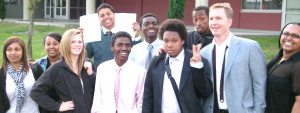OVERVIEW – Read All
The Civics for All Initiative seeks to make Seattle a model civics education city
The Background:
- The Civics for All Initiative was first presented to the Seattle School Board by a dozen Franklin High students in the spring of 2011. See above video.
- We seek adoption from Superintendent Banda and the School Board this fall and hope to implement the proposal in the 2014-2015 school year.
- The six-plank proposal is student-centered, teacher-friendly, and virtually turnkey for administrators.
- As such, Civics for All offers a set of curricular structures and requirements designed to facilitate integration of civics lessons into almost any standing lesson in any discipline, but especially in the social studies.
- The proposal is minimally prescriptive and gives teachers options for infusing civics into their current or new units.
- Recent controversies in Seattle public schools (the MAPS test boycott and the federal investigation of racially disproportionate discipline numbers) highlight the need for much greater understanding of democratic processes and improved communication between all members of our school communities. A “civic culture of learning” can and would facilitate more effective discourse on issues like these for students and adults alike.
The Problem:
- Most kids know little about their democracy: 75% of American teens failed the last national civics test and only 2% of 4th graders performed at the Advanced level.
- Worse, many of our Seattle youth display a profound sense of alienation and apathy about their government and civic life.
- Less than 20% of 18-29 year olds vote in mid-term elections.
- Currently, in the social studies, the Seattle School District and the state of Washington require a shockingly low amount of civics instruction – only one week of civics is required in 5th, 7th, and 12th grades.
The Solution:
- Dramatically increase social studies instruction in civics – which includes the rights and duties of citizens, government studies, ethics, current events, and politics.
- Recognize that Civics for All is also “Civics in the Core”—civics texts, principles, and activities align perfectly with the Common Core’s emphasis on building argumentative claims from non-fiction texts.
- Recognize that even a revamped social studies effort cannot tackle the profound “civics deficit” alone: all K-12 teachers are needed to help teach “civics across the curriculum” whenever efficacious.
- People recognize the truth of one of history’s oldest lessons, that in times of crisis, people instinctively look for simplistic solutions to complex problems, and it is the most well – intentioned who are often leading the way. Simple educational solutions like STEM for All or AP for All will not equip our students with the complex set of skills, democratic values, and dispositions that they must possess to become actively engaged citizens – and the complexities of learning to vote wisely will!
- For example: a) math might include lessons on wages, taxes and the deficit; b) foreign languages might cover immigration issues; c) science could frame environmental issues within their political contexts; d) and language arts could help further develop civic themes as well as media literacy skills.
- Research clearly shows that interdisciplinary instruction maximizes critical thinking for students and builds instructional bridges between teachers. Civics texts and current events connections can increase learning in non-social studies classes where many students struggle, such as math and science (some of these teachers already do so).
- Civics-based lessons/texts directly address the Common Core’s hierarchy of skills and can facilitate success in the Core in multiple disciplines when teachers deem it efficacious.
- Infuse media literacy throughout the K-12 curriculum – civic literacy is virtually unattainable without media literacy.
- Recognize that “Civics education is political education,” as Stanford University’s Encyclopedia notes.
- Recognize that kids love civics and politics! Civics for All leverages this natural interest by helping teachers and administrators infuse civics lessons throughout the school day and school year, including required civics activities for all children, like voting.
The Support for Civics for All has been tremendous!
- National and local support for the Initiative is enormous — numerous elected officials on the school board, the City Council, and in Olympia have rallied to support Civics for All – including Seattle School Board president Kay Smith-Blum, King County Elections Director Sherril Huff, and state Senator Jeanne Kohl-Wells, to name just a few.
- Dozens upon dozens of teachers, civic leaders, and other citizens have also stood up for civics for all of our young people. Groups like CityYear and KidsVotingUSA have also answered the call to once and for all restore education for democratic citizenship back to the top shelf of priorities for our schools.
- Civics for All represents a golden opportunity for Seattle to help lead the civics education movement that Justice Sandra Day O’Connor is leading across the nation.
- Ultimately the success of the Civics for All Initiative depends on you!!! Please email Superintendent Banda and your school board member with your support, spread the word about Civics for All, and get involved!
“The greatest menace to freedom is an inert people.”
— Supreme Court Justice, Louis D. Brandeis,
Whitney v. California, 1927
Fundamental rationales:
- The American Enterprise Institute recently announced that civic literacy is just as critical to success as mathematics and literacy, according to the findings of a massive ten paper research effort on civics education published in November 2012 by the Harvard Press.
- Interdisciplinary instruction maximizes critical thinking for students and builds instructional bridges between teachers. Civics and current events connections can increase learning in non-social studies classes.
- Research by the Gates Foundation proves that millions of teenagers demand that school be made relevant to their lives or they will tune out.
- Civics for All makes school relevant by leveraging connections between required course content and civics, politics, current events and media literacy.
- Research by the National Learn and Serve Clearinghouse and others shows that not only teens but also elementary school students make enormous affective and cognitive growth when applied civics/service learning lessons are used.
- A Gates Foundation funded study found that 83% of at-risk learners report increased interest in school when applied civics/service learning lessons are used. The linked Learn and Serve slide show is excellent.
- There is a profound and damaging “civics deficit” for minority, at risk, and low-income students in America, according to a 2008 Circle Report.
- Social Studies Civics EARLs (Essential Academic Learning Requirements) are overly general and generally ignored.
- One semester of senior government class is too little, too late.
- Media literacy is essential to democratic citizenship.
- Teaching civics across the K-12 common-core curriculum helps ensure equitable education and consistency for all, especially students who switch schools once or more, as do prior district wide initiatives like writing across the curriculum.
- Civics for All anticipates and aligns with the federal government’s slow-footed acknowledgement that civics education is essential.
Common Core:
Civics for All is “Civics in the Core” because civics studies align so smoothly with the coming Common Core State Standards’ emphasis on distilling argumentative claims from non-fiction texts.
Four standards ready for civics applications:
- CCSS.ELA-Literacy.CCRA.SL.1(5): Prepare for and participate effectively in a range of conversations and collaborations with diverse partners, building on others’ ideas and expressing their own clearly and persuasively
- CCSS.ELA-Literacy.CCRA.SL.3(6): Evaluate a speaker’s point of view, reasoning, and use of evidence and rhetoric
- CCSS.ELA-Literacy.CCRA.R.8(7): Delineate and evaluate the argument and specific claims in a text, including the validity of the reasoning as well as the relevance and sufficiency of the evidence
- CCSS.ELA-Literacy.CCRA.W.1(8): Write arguments to support claims in an analysis of substantive topics or texts using valid reasoning and relevant and sufficient evidence
Civics for All aligns directly with and will facilitate student success on the “New SAT,” which emphasizes America’s founding documents and current events analysis for the first time in the history of the test.
Job and career readiness:
Civics builds essential work-place knowledge,skills, and dispositions
- The American Enterprise Institute recently announced that civic literacy is just as critical to success as mathematics and literacy, according to the findings of a massive ten paper research effort on civics education published in November 2012 by the Harvard Press.
- Civics lessons increase job-readiness, according to this ABA commissioned report.
- The Seattle School District has long recognized that a wholistic, K-12 interdisciplinary approach to managing curricula requires essential touchstones like “Reading across the curriculum” and “Math across the curriculum” – “Civics across the curriculum” supports this crucial approach by providing content knowledge AND dispositions that can help kids, teachers, and schools all achieve greater success.
- Teaching more civics honors our city’s commitment to give all of our children the best possible chance to succeed in school and to be actively engaged in Seattle’s great civic traditions.
- Washington’s OSPI already requires science teachers to “provide…social studies and humanities” perspectives in environmental units as per RCW 28.A230.020 and WAC 180-50-115 –this wise policy honors Seattle’s environmental tradition and offers a great starting place to deepen civics connections in science classes, when efficacious.
- The Civics for All Initiative supports and seeks to expand the use of key civics curricula in the Seattle Public Schools, including fifth grade use of Project Citizen and iCivics, an online civics/politics/government program promoted by Justice Sandra Day O’Connor.
- Our initiative is in alignment with the powerful and growing civics education movement being led by groups like the Center for Civic Education and Justice O’Connor’s organization the Campaign for the Civic Mission of Schools.
- Civics curriculum is abundant. We should use it!
Building community: Civics brings communities together
- Civics for All will transform K-12 schools into “civic cultures,” where academic achievement and civic activism soar in tandem.
- Civics for All promotes wrapping anti-bullying initiatives and curricula into a civics framework.
- Well-crafted, politically non-partisan civics lessons build bridges of truth, honesty, and tolerance between races, ethnicities, classes, and political viewpoints. And, civic debates and discussions bring families together in the great American democratic tradition of dialogue and debate.
- Civics/Service Learning instruction increases civic engagement: students are more likely to contribute actively to their communities and vote 15 years later.
- Civics for All makes students and classrooms come alive — and teachers thrive — with civics-based lessons. As the teaching profession is revitalized, openness and collective productivity will transform our school cultures.
- Public relations – big civics push would be good PR for the District.
- Civics for All makes school relevant by leveraging connections between required course content and civics, politics, current events and media literacy.
- Classroom connections that emphasize media literacy (video, digital, etc.) increase K-12 student interest and pedagogical efficacy.
- Civic life, politics, and social media are now inextricably intertwined for teens, according to the Pew Research Center. Isn’t it time our curricula reflected this reality and taught all students to master these connections?
This website is designed as a Common Resource for Seattle civics-education boosters and as a model for educators in schools and districts across the country who would like to adopt the approach or elements of it.





